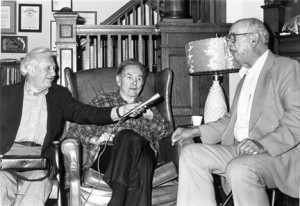“People are hungry for stories. It’s part of our very being. Storytelling is a form of history, of immortality too. It goes from one generation to another.” So said Studs Terkel, famous New York historian and broadcaster. Beginning with his radio show, The Studs Terkel Program, he made his name as a collector of stories, and went on to publish a variety of oral history-fueled works. Today, his books are still considered classics.
Oral historians make room for the stories we don’t usually hear. They welcome the silenced, hand the microphone to the underdog, bring the disenfranchised to the front of the room and give them space to speak. Because of this, oral histories often provide us with stories we don’t usually get to hear, which is what makes them so fascinating. Nowadays, oral history is having a sort of renaissance. You’ve got Dave Isay’s NPR affiliate StoryCorps, which collects stories of everyday people through mobile recording studios and booths in uber populated areas, such as train stations and museums. Community organizations and libraries boast their own oral history troves, like the New York Public Library’s collection of neighborhood histories and patron interviews. Even right here in Pittsburgh, local historians are hard at work collecting recordings on topics ranging from the history of the Jewish community to local veterans and their remembrances.
There are oral histories of practically everything. Sports teams, popular movies, neighborhoods, protests, bands…the list goes on. If there are people willing to talk about a thing, chances are, someone has collected their stories. These three, varied collections are a good place to start:
Hard Times: An Oral History of the Great Depression
By Studs Terkel
DB 24995
Through personal interviews the author, a radio broadcaster in Chicago, records more than 160 Americans’ comments on their experiences and memories of the depression of the 1930’s. 1970.
Just Kids From the Bronx: Telling It the Way It Was: An Oral History
By Arlene Alda
DB 81665
Alda collects oral histories from influential people in a variety of fields about life growing up in the Bronx. The individuals interviewed include professional baseball players, scientists, musicians, nuns, police officers, actors, artists and entrepreneurs, spanning six decades of Bronx living. 2015.
What We Have Done: An Oral History of the Civil Rights Movement
By Fred Pelka
DB 74570
Twentieth-century disability activists describe their political struggles for basic human rights, which led to the Americans with Disabilities Act of 1990. They discuss landmark campaigns, including the demand for a deaf president at Gallaudet University and ADAPT’s struggle for accessible public transit. 2012.
